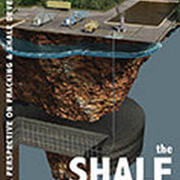
Shanti Gamper-Rabindran '94, Associate Professor, University of Pittsburgh, authors "The Shale Dilemma: A Global Perspective on Fracking and Shale Development"
https://shanti1.weebly.com/shale-book.html
This comparative study, which brings together in-country experts from eight developed and emerging economies, explains how countries have chosen to strike very different trade-offs in the debates surrounding energy security, economic development, climate change, and local participation in shale gas decision making. Those trade-offs reflect the nature of a country’s political process and the power of interest groups on both sides of the issue. As an informative and even-handed account, The Shale Dilemma recommends practical steps to help countries reach better, more transparent, and more far-sighted decisions.
Description
The US shale boom and efforts by other countries to exploit their shale resources could reshape energy and environmental landscapes across the world. But how might those landscapes change? Will countries with significant physical reserves try to exploit them? Will they protect or harm local communities and the global climate? Will the benefits be shared or retained by powerful interests? And how will these decisions be made?
The Shale Dilemma brings together experts working at the forefront of shale gas issues on four continents to explain how countries reach their decisions on shale development. Using a common analytical framework, the authors identify both local factors and transnational patterns in the decision-making process. Eight case studies reveal the trade-offs each country makes as it decides whether to pursue, delay, or block development. Those outcomes in turn reflect the nature of a country’s political process and the power of interest groups on both sides of the issue. The contributors also ask whether the economic arguments made by the shale industry and its government supporters have overshadowed the concerns of local communities for information on the effects of shale operations, and for tax policies and regulations to ensure broad-based economic development and environmental protection.
Recommendations
“The Shale Dilemma brings together leading energy experts to take stock of the multifaceted reasons for why countries decide to (or not) develop their shale gas reserves. Drawing on the US experience, the impressive collection of case studies from across the globe capably examines debates surrounding energy security, economic development, climate change, and local participation in shale gas decision making.” —Erika Weinthal, Lee Hill Snowdon Professor of Environmental Policy, Duke University
“North America’s shale gas revolution has been a global game changer. The key question is what happens next? This volume provides an indispensable guide to the future prospects for the global industry. A common framework is used to explore the ‘shale dilemma’ in countries with commercial production, where exploration is at an early stage and where it is banned. The analysis moves beyond established critiques to address the key issues of differential impact and equity and suggests how countries might make better decisions.”—Michael Bradshaw, Professor of Global Energy, Warwick Business School, United Kingdom
Table of Contents
Introduction: The Shale Dilemma Shanti Gamper-Rabindran
Part I: The United States
1. Mixed Fortunes: The Risks and Rewards of Developing Shale Gas
Shanti Gamper-Rabindran
2. Should Benefits and Costs Be Spread More Evenly? Political Battles over Local Government Powers, Taxation, Regulation, and Disclosure
Shanti Gamper-Rabindran
Part II: Europe
3. The United Kingdom. To Develop or Not to Develop: One Nation or Localization?
Jim Skea
4. Poland. Disappointed Expectations: Energy Security vs. Bureaucracy and Geology
Michael LaBelle
5. France. The Power of Public Opposition: From Permits to Protests to Bans
Patrice Geoffron
6. Germany. The German Energiewende and the Decision to Ban Unconventional Hydraulic Fracturing Miranda A. Schreurs
Part III: Emerging Economies
7. China. Replacing Coal with Shale Gas: Could Reducing China’s Regional Air Pollution Lead to More Local Pollution in Rural China?
Alvin Lin
8. Argentina. Energy Extraction and Communities: Can Shale Development Proceed without Causing Pollution and Conflicts?
María Florencia Saulino
9. South Africa. Trying Not to Repeat History: Are Shale Gas Development and Broad-Based Economic Development Compatible?
Barry Morkel and Maarten de Wit
Conclusion: How and Why Countries Decide on Shale, and How They Can Make Better Decisions
Shanti Gamper-Rabindran
Contributors
UK Prof. James Skea, Imperial College London,
Co-Chair Working Group III Intergovernmental Panel on Climate Change
Germany Prof. Miranda Schreurs, Technical University Munich
Chair Climate and Energy Policy
Germany Advisory Council on the Environment
France Prof. Patrice Geoffron, University of Paris-Dauphine
Chair Climate Economics
Director Centre of Geopolitics of Energy and Raw Materials
China Alvin Lin, J.D. Natural Resource Defense Council, Beijing office
Director, China Climate and Energy Policy
South Africa Barry Morkel, Earth Stewardship Science Research Institute, Nelson Mandela Univ.
Prof Maarten de Wit, PI, Karoo Baseline Study, ESSRI and NMU
Argentina Prof. Florencia Saulino, Universidad de Palermo, Buenos Aires
Director, Center for Environmental Law
Poland Prof. Michael LaBelle. Central European University
CEU Business School